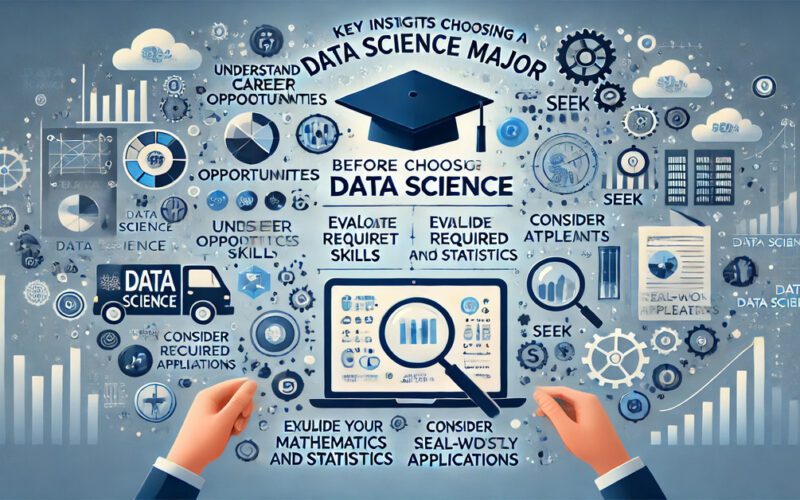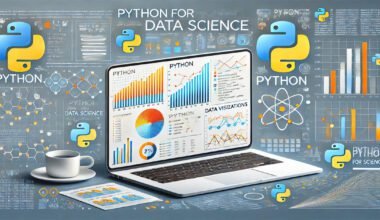Summary: Selecting a Data Science Major involves considering personal interests, career goals, and emerging job market trends. Mastering key skills like programming and data visualisation prepares students for successful careers in this dynamic field.
Introduction
It has emerged as a vital field, transforming how industries analyse data and make informed decisions. From healthcare to finance, the demand for data-driven insights continues to grow, highlighting the need for skilled professionals. Choosing the right major is crucial for a successful career in this dynamic landscape.
This blog aims to guide prospective students through essential insights and considerations when selecting a Data Science Major, helping them align their interests and career goals with academic programs that will prepare them for the evolving job market.
Key Takeaways
- Align your Data Science Major with personal interests and goals for a fulfilling career.
- Develop essential programming, statistics, and Machine Learning skills to thrive in the field.
- Stay updated on industry trends and network with professionals to enhance your opportunities.
Understanding Data Science
It is an interdisciplinary field that leverages scientific methods, algorithms, and systems to extract insights from structured and unstructured data. It combines statistics, computer science, and domain expertise to address complex problems and drive informed decision-making across various industries.
The scope of Data Science extends to numerous applications, including predictive analytics, Data Visualisation, and Machine Learning, enabling organisations to enhance efficiency and innovate. Key skills vital for success in Data Science include:
- Statistics: A strong foundation in statistical concepts allows Data Scientists to interpret data effectively and validate their findings.
- Programming: Proficiency in programming languages such as Python and R facilitates data manipulation, analysis, and task automation.
- Machine Learning: Knowledge of Machine Learning algorithms empowers Data Scientists to build predictive models and identify patterns within data.
- Data Visualisation: Skills in data visualisation tools, like Tableau or Matplotlib, help communicate complex results clearly to stakeholders.
By mastering these skills, aspiring Data Scientists can harness the power of data to solve real-world problems and drive strategic initiatives in their organisations.
Factors to Consider When Choosing a Data Science Major
Choosing a major in Data Science is a significant decision that can shape your career trajectory. It’s essential to consider various factors to ensure your choice aligns with your interests, career goals, and the evolving job market. Below are crucial aspects to consider when selecting a major.
Interest and Passion
Your interest in data and analytics is paramount. Passion for understanding data patterns, solving problems, and making data-driven decisions can enhance your learning experience and overall satisfaction in your studies. This requires a strong analytical mindset and a curiosity to explore how data influences various domains, from healthcare to finance.
If you find joy in uncovering insights from raw data, then a major in Data Science could be the right fit. Your enthusiasm will drive you to delve deeper into complex subjects like Machine Learning, Statistical Modelling, and Data Visualisation.
Furthermore, a genuine interest will help you overcome challenges and stay motivated throughout your academic journey, especially when faced with demanding coursework.
Career Goals
Aligning your major with your long-term career aspirations is crucial. Different roles in Data Science require varied skill sets and knowledge bases.
For instance, to become a Data Analyst, you should focus on acquiring data manipulation, statistical analysis, and data visualisation skills. On the other hand, aspiring Data Engineers should emphasise programming skills, database management, and cloud computing.
Moreover, roles such as Machine Learning engineers demand a solid understanding of algorithms, programming languages, and advanced statistics. Consider what positions excite you and tailor your academic focus accordingly. Researching job descriptions and talking to professionals in the field can provide valuable insights into the skills and knowledge you need to acquire to reach your career objectives.
Job Market Trends
The job market for Data Science professionals is robust and growing. According to the “Data Science Education Report 2023,” the global Data Science platform market was valued at $95.3 billion in 2021 and is forecast to reach $322.9 billion by 2026, growing at a compound annual growth rate (CAGR) of 27.7%.
This staggering growth reflects the increasing reliance on data across various sectors, signalling a high demand for skilled Data Scientists.
The situation is equally promising in India. AIM Research indicates that 74.5% of large companies are adopting analytics and Data Science. In October 2020 alone, over 93,500 analytics jobs were available in the country. This demand will continue as businesses integrate data-driven strategies into their operations.
Furthermore, the global Data Science education sector will reach $378.7 billion by 2030. In India, the Data Science education market is set to explode from $204.23 million in 2023 to $1.391 billion by 2028, with an extraordinary CAGR of 57.52%. Such trends illustrate the expanding opportunities for Data Science graduates, making it a promising field for prospective students.
Emerging Trends in Data Science Fields
As you explore your options, staying informed about emerging trends in Data Science can help guide your decision. Areas such as Artificial Intelligence, Machine Learning, and Big Data Analytics are rapidly evolving. For instance, the growing emphasis on ethical AI and data privacy shapes how organisations approach data utilisation.
Additionally, integrating automation and Data Science creates new organisational roles and responsibilities. Understanding these trends can help you align your studies with the skills in demand, making you a more attractive candidate in the job market.
Moreover, consider specialising in niche areas such as natural language processing, computer vision, or Data Engineering. These specialisations are gaining traction and can differentiate you from other candidates when applying for jobs.
Evaluating Academic Programs
When considering a Data Science major, evaluating academic programs is crucial to ensure they align with your educational and career goals. A well-structured program equips you with theoretical knowledge and prepares you for real-world applications. Here are the key components to assess when evaluating Data Science academic programs.
Curriculum Analysis
The curriculum forms the backbone of any Data Science program. Look for programs that offer a comprehensive range of courses covering essential topics. Key courses to prioritise include:
- Data Mining: This course teaches you how to extract meaningful patterns from large datasets, a fundamental skill in Data Science.
- Big Data Technologies: Understanding big data frameworks like Hadoop and Spark is essential, as they enable you to process vast amounts of data efficiently.
- Artificial Intelligence and Machine Learning: Courses that delve into AI and Machine Learning principles will help you develop models that can learn from data, an indispensable aspect of modern Data Science.
A robust curriculum should also include courses on statistics, data visualisation, and programming languages such as Python and R. Assessing the breadth and depth of the curriculum will give you insights into how well the program prepares you for various Data Science roles.
Faculty Expertise
Learning from experienced faculty members and industry professionals is vital for your academic success. Faculty expertise enriches your educational experience by providing valuable insights and real-world applications of theoretical concepts.
Research the qualifications of the faculty in the programs you are considering. Professors with industry experience often bring practical perspectives to the classroom, enhancing your understanding of current Data Science challenges.
Engaging with faculty with a strong research background can also provide opportunities for you to participate in innovative projects, further enriching your learning experience.
Hands-On Learning Opportunities
Theoretical knowledge alone is insufficient in Data Science. Practical experience is essential for developing your skills. Look for programs emphasising hands-on learning opportunities through internships, projects, and collaborative work.
Internships allow you to apply what you learn in real-world settings, helping you build a professional network and gain industry exposure. Projects involving real datasets also enable you to tackle genuine Data Science problems, enhancing your problem-solving abilities.
Participating in hackathons or collaborative projects with peers can also foster teamwork skills, which are crucial in a professional environment.
Skills and Tools to Focus On
When pursuing a Data Science major, it’s crucial to focus on specific skills and tools that form the backbone of this field. Mastering the right programming languages, data visualisation tools, and statistical knowledge will significantly enhance your analytical capabilities and employability.
Programming Languages
Programming languages like Python, R, and SQL are pivotal in Data Science.
Python stands out for its versatility and ease of use, making it the preferred choice for data manipulation, Machine Learning, and automation. Its extensive libraries, such as Pandas, NumPy, and Scikit-learn, streamline complex tasks, enabling you to focus on analysis rather than coding intricacies.
R is another powerful language favoured for statistical analysis and data visualisation. It offers a rich ecosystem of packages, such as ggplot2 and dplyr, which simplify complex statistical tasks.
Lastly, SQL (Structured Query Language) is essential for managing and querying relational databases, allowing you to extract and manipulate large datasets efficiently.
Data Visualisation Tools
Data visualisation is crucial in communicating insights derived from Data Analysis. Tools like Tableau and Power BI empower Data Scientists to create interactive and insightful visual representations of data.
Tableau excels in transforming complex datasets into visually appealing dashboards, facilitating better decision-making. Integrated with Microsoft products, Power BI provides a user-friendly interface that enables seamless data exploration and visualisation, making it an excellent choice for organisations already using Microsoft tools.
Familiarity with these tools enhances your ability to present findings clearly and effectively to stakeholders.
Statistical Knowledge
A solid foundation in statistics is vital for practical Data Analysis and informed decision-making. Understanding statistical concepts such as hypothesis testing, regression analysis, and probability distributions allows you to derive meaningful insights from data.
Statistics not only aids in interpreting data accurately but also informs predictions and strategic planning. Mastering these statistical principles will equip you to tackle real-world problems confidently, making you a valuable asset in any data-driven organisation.
Alternative Learning Paths
As you explore a Data Science major, consider alternative learning paths that can enhance your knowledge and skills. These options provide flexibility and practical experience, making them appealing to aspiring Data Scientists.
Online Courses and Bootcamps
Online courses and bootcamps offer a structured way to learn Data Science concepts efficiently. Programs like those offered by Pickl.AI, one of India’s best Data Science course providers, feature 11 comprehensive modules covering 462 lessons.
Topics include The Data Mindset, Advanced SQL, BI-Tableau, Power BI, Python for Data Science, and essential statistics. These courses are tailored for beginners and professionals, ensuring you build a robust foundation in Data Science.
Certifications in Data Science-Related Fields
Pursuing certifications can enhance your resume and demonstrate your expertise to potential employers. Look for programs that align with industry standards and focus on relevant skills, such as Machine Learning, data visualisation, and programming languages.
Importance of Self-Study and Continuous Learning
Self-study is vital to becoming a successful Data Scientist. Engage with online resources, books, and tutorials to supplement your learning. Moreover, this field evolves rapidly, making continuous learning essential. Embrace new tools and techniques, such as Prompt Engineering and clustering methods, to stay ahead in this dynamic industry.
By exploring these alternative paths, you can tailor your education to fit your career goals while acquiring the skills necessary for success in Data Science.
Networking and Community Engagement
Building a strong network is crucial for anyone pursuing a career in Data Science. Connecting with professionals in the field opens doors to mentorship, collaboration, and job opportunities. Engaging with others who share your interests can enhance your knowledge and broaden your perspectives.
Importance of Connecting with Professionals
Establishing relationships with experienced Data Scientists lets you gain insights into industry trends and best practices. Networking can lead to valuable advice on skills to develop, tools to use, and potential career paths. Moreover, many job openings are filled through referrals, making connections vital in your job search.
Engaging in Data Science Communities
Participating in Data Science communities can significantly enhance your learning experience. Online forums like Reddit or specialised LinkedIn groups offer platforms to ask questions, share resources, and discuss challenges.
Attending meetups and conferences, both local and virtual, provides opportunities to connect face-to-face with industry experts and fellow enthusiasts. These events often feature talks and workshops that deepen your understanding of current topics and emerging technologies in Data Science.
By actively engaging in these communities, you expand your network and contribute to a supportive ecosystem that fosters growth and innovation.
Closing Thoughts
Choosing a Major is a pivotal step toward a rewarding career. By aligning your interests and career goals with the right academic program, you can develop essential statistics, programming, and machine learning skills.
Staying informed about industry trends and networking can further enhance your opportunities, making you a competitive candidate in this dynamic field.
Frequently Asked Questions
What Skills are Essential for a Data Science Major?
A Data Science Major requires proficiency in statistics, programming languages like Python and R, Machine Learning concepts, and data visualisation tools like Tableau. Mastering these skills prepares students for diverse roles in the Data Science field.
What are the Career Options After Pursuing a Data Science Major?
Graduates can explore various roles, including Data Analyst, Data Engineer, Machine Learning Engineer, and Data Scientist. Each position emphasises different skills, so students should tailor their studies to their career aspirations.
How Do Job Market Trends Affect Choosing a Data Science Major?
The job market for Data Science professionals is rapidly growing, with increasing demand for skilled experts. Researching market trends helps students choose a Data Science Major that aligns with promising career opportunities.




